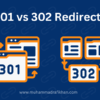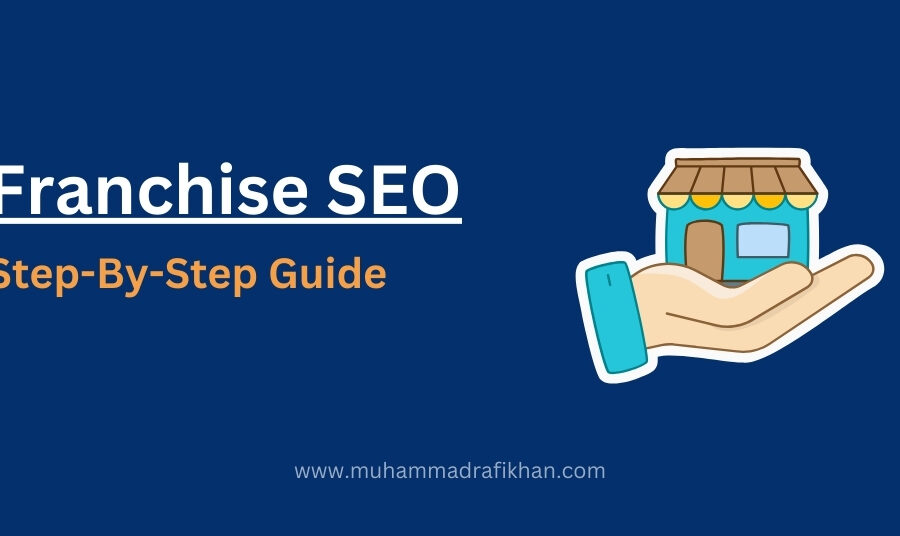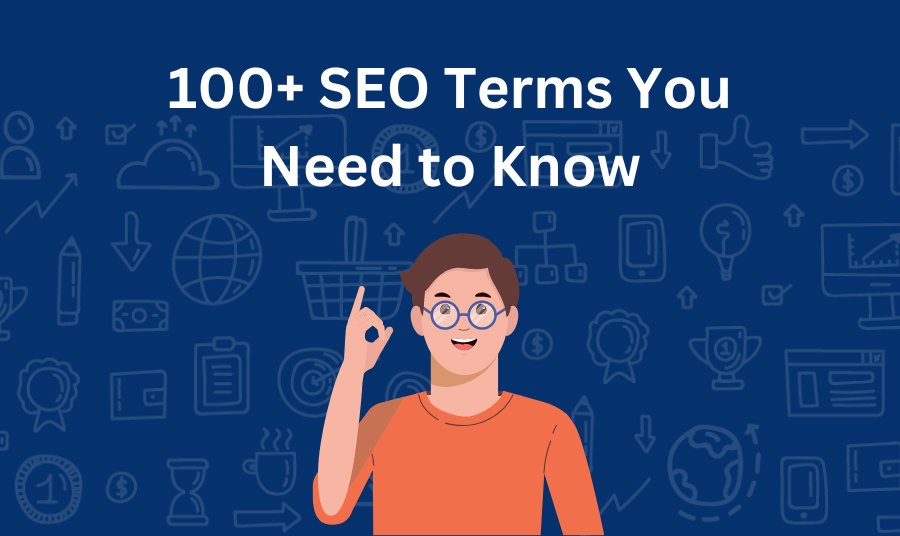In the world of websites and getting noticed on the internet, there’s an important thing called “links.” These links come in two types: “DoFollow” and “NoFollow.” Understanding these links in 2023 can make a big difference for your website.
This easy-to-follow guide will help you understand what DoFollow and NoFollow links are all about. It will give you the knowledge you need to make smart choices for your website, whether you’re new to this or already know a bit. So, let’s discuss and make sense of these links!
What Is a DoFollow Link?
A “dofollow” link in SEO is a type of hyperlink that allows search engines like Google to follow and pass link equity/authority from one web page to another. This means that when a search engine crawls a web page containing a dofollow link, it will consider the linked page as a valuable resource and may use this information to determine the linked page’s relevance and authority in relation to the anchor text and content surrounding the link.
Imagine you have a website, and you’ve included links to other websites on your pages. Some of these links may be highly relevant and related to your content, while others could be there for various purposes, including advertising or recommendations. When you use a “Dofollow” link, you’re essentially telling search engines, “This link is significant, and it’s an endorsement or recommendation.”
What Is a NoFollow Link?
A “Nofollow” link in SEO is like a road sign that tells search engines, like Google, to ignore the link when they’re deciding which websites to show in search results. It’s a way to tell search engines not to follow the link and not to give any SEO credit to the website the link points to.
Imagine you have a website, and you have some links to other websites on your pages. Some of these links may be helpful and related to your content, while others might be there for advertising or other reasons. When you add a “Nofollow” attribute to a link, it’s like telling search engines, “Hey, don’t pay too much attention to this link. It’s not an endorsement or recommendation.”
So, if a website links to another site using a “Nofollow” attribute, it won’t pass on any of its SEO juice or authority to the linked site. In other words, it won’t boost the linked site’s ranking in search results. This can be useful for preventing spam or for indicating that you don’t want to vouch for the quality or trustworthiness of the linked website.
How to Identify Whether a Page Has “Dofollow” or “Nofollow” links?
Identify Dofollow/Nofollow Links Using Manual Method:
To identify whether a page has “dofollow” or “nofollow” links, you can follow these steps:
1. Right-Click on a Hyperlink:
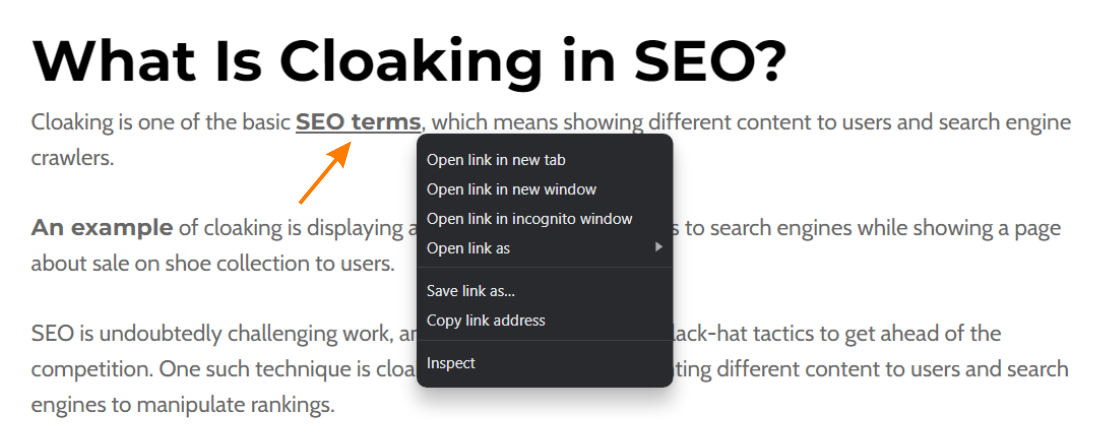
2. Select “Inspect”:
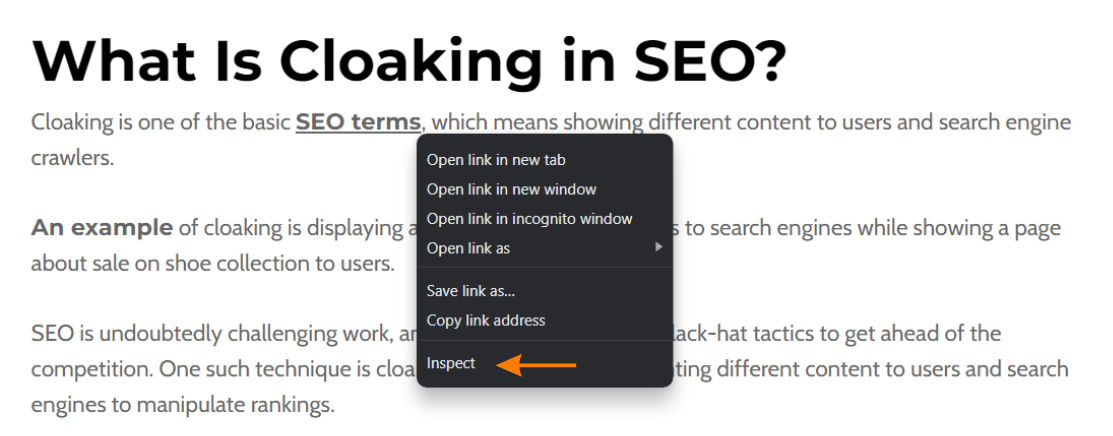
3. Check for the “rel” Attribute:

4. Here’s a breakdown:
<a href=”https://muhammadrafikhan.com”/blog/seo-terms/”>SEO terms</a>:
This is usually a “Dofollow” link, it’s important to note that usually websites don’t explicitly specify “dofollow” because it’s the default behavior.
<a href=”https://muhammadrafikhan.com”/blog/seo-terms/”rel=”nofollow“>SEO terms</a>:
This is a “nofollow” link.
Identify Dofollow/Nofollow Links Using Mozbar [Extension]:
To identify whether a page has “dofollow” or “nofollow” links through Mozbar, you can follow these steps:
1. Download the extension:

2. After logging in you’ll see a “Highlight Links” icon, click on it:
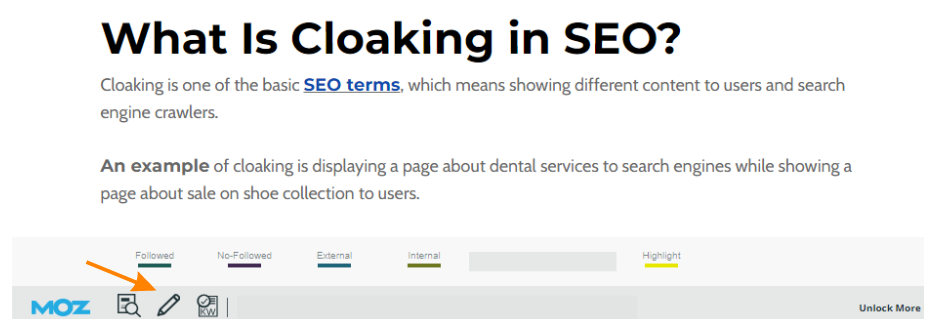
3.Click on “Followed/Dofollow” or “No-Followed” to identify links:
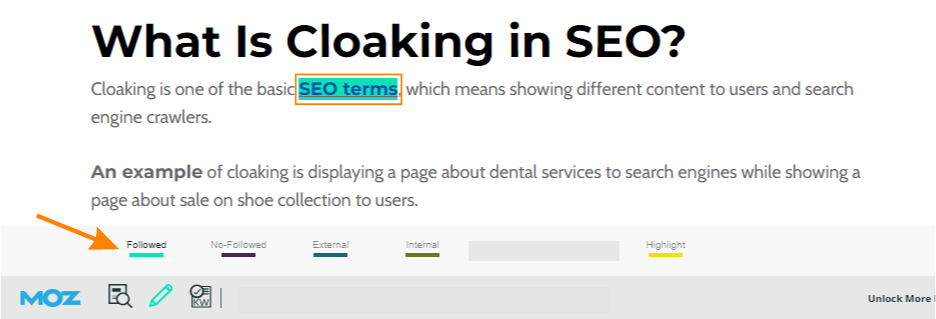
Are Dofollow Links Good for SEO?
Dofollow links are indeed valuable for SEO (Search Engine Optimization), and they play a crucial role in helping websites improve their search engine rankings. Here are some valuable insights on why dofollow links are good for SEO:
1. Passing Link Juice: Dofollow links pass “link juice” from one webpage to another. This means that when a reputable and authoritative website links to your site using a dofollow link, it passes on some of its SEO value to your website. This can help improve your site’s authority and ranking.
2. Improved Search Engine Rankings: Search engines like Google consider the number and quality of backlinks when ranking websites. Dofollow links from reputable sources can positively impact your website’s ranking in search results.
3. Credibility and Trust: When your website receives dofollow backlinks from authoritative and trusted sources, it can enhance your site’s credibility and trustworthiness in the eyes of both search engines and users.
4. Increased Organic Traffic: Higher search engine rankings resulting from dofollow backlinks can lead to increased organic traffic to your website. This can be particularly beneficial for businesses looking to grow their online presence.
5. Balanced Link Profile: While dofollow backlinks are valuable, it’s essential to maintain a balanced link profile. A healthy mix of dofollow and nofollow backlinks appears more natural to search engines and can prevent potential penalties.
6. Relevance Matters: The context and relevance of the dofollow backlinks are essential. Links from websites in the same niche or industry can have a more significant impact on your SEO because they signal to search engines that your content is authoritative and relevant.
7. Quality Over Quantity: It’s better to have a few high-quality dofollow backlinks from authoritative sources than numerous low-quality ones. Quality should always be a priority when building backlinks for SEO.
Should We Acquire Backlinks With Nofollow Attributes?
Acquiring backlinks with the “nofollow” attribute can be a valuable part of your overall link-building strategy, but it’s essential to approach this tactic strategically. To fully understand whether or not you should acquire “nofollow” backlinks, let’s delve into some valuable insights:
1. Diversity in Link Profile: Search engines like Google value a diverse backlink profile. A mix of “follow” and “nofollow” links can appear more natural and signal that your website is not trying to manipulate search rankings. Having an entirely “follow” link profile might raise red flags.
2. Credibility and Authority: High-authority websites that use “nofollow” links can still drive valuable traffic to your site. These links can also indirectly enhance your site’s credibility by association. Therefore, acquiring “nofollow” backlinks from reputable sources, such as news sites or industry-specific blogs, can be worthwhile.
3. Relevance Matters: The context in which the “nofollow” link is placed is crucial. If the link is on a relevant and high-quality page within your niche, it can still contribute to your site’s authority and SEO. Relevance often outweighs the “nofollow” attribute in such cases.
4. User Engagement: Consider how “nofollow” backlinks can contribute to user engagement and referral traffic. Even if these links don’t pass PageRank, they can still drive real users to your site who may convert, share your content, or become loyal customers.
5. Risk Mitigation: Acquiring “nofollow” backlinks can be a safe way to build links without risking penalties from search engines. Google’s guidelines discourage the manipulation of PageRank through “follow” links, but they generally do not penalize for “nofollow” links.
6. No Guaranteed SEO Benefits: It’s important to note that “nofollow” links do not directly contribute to your site’s SEO in the same way as “follow” links. They don’t pass link equity or PageRank. Therefore, if your primary goal is to improve SEO rankings, “follow” links may be more beneficial.
7. Content Quality Matters: Regardless of the attribute, the content surrounding the link is crucial. Quality content that provides value to users is more likely to attract “nofollow” links and generate positive user signals, which can indirectly benefit your SEO efforts.
8. Avoid Spammy Tactics: Acquiring “nofollow” links should not be an excuse for engaging in spammy link-building practices. Google can penalize websites that engage in manipulative or spammy tactics, whether the links are “follow” or “nofollow.”
Final Thoughts?
The DoFollow vs. NoFollow link debate isn’t about one being better than the other. Both have their roles in a well-rounded SEO strategy. By understanding their differences and using them strategically, you can enhance your website’s visibility, authority, and overall SEO performance in 2023 and beyond.
FAQs About Dofollow vs Nofollow Links
What is the primary difference between a dofollow and a nofollow link?
A dofollow link is a hyperlink that allows search engines to follow it and pass on link juice or SEO value to the linked page. In contrast, a nofollow link tells search engines not to follow the link or transfer any SEO value.
Why are dofollow links important for SEO?
Dofollow links are important for SEO because they contribute to a website’s search engine ranking. When reputable websites link to your content with dofollow links, it can boost your site’s authority and improve its chances of ranking higher in search engine results.
What are the benefits of using nofollow links?
Nofollow links can be beneficial in several ways. They can help prevent spam comments on your website, manage affiliate links, and maintain the integrity of user-generated content without passing SEO value to potentially low-quality sources.
How do search engines treat dofollow and nofollow links differently?
Search engines follow dofollow links and use them as signals for ranking and crawling. Nofollow links, on the other hand, are not followed by search engine bots, so they do not pass on link juice or impact rankings directly.
Does using too many dofollow links on a page have any negative consequences?
Excessive use of dofollow links on a page can potentially dilute the SEO value passed to each link, making it less effective. It’s important to maintain a reasonable ratio of dofollow to nofollow links for optimal SEO.


![DoFollow vs. NoFollow Links: A Simple & Easy Guide [2023]](https://muhammadrafikhan.com/wp-content/uploads/2023/04/Banner-image.png)
![DoFollow vs. NoFollow Links: Simple & Easy Guide [2023]](https://muhammadrafikhan.com/wp-content/uploads/2023/09/DoFollow-vs.-NoFollow-Links-Simple-Easy-Guide-2023.png)


![DoFollow vs. NoFollow Links: Simple & Easy Guide [2023]](https://muhammadrafikhan.com/wp-content/uploads/2023/09/DoFollow-vs.-NoFollow-Links-Simple-Easy-Guide-2023-100x100.png)
